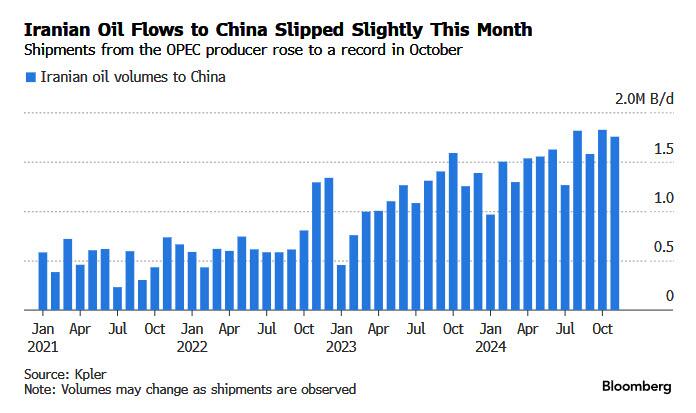(Zero Hedge)—After years of abusing Iranian sanctions and flooding China’s economy with cheap Iranian oil, China’s larger independent refiners are set to shun Iranian oil “imminently” because of their exposure to the US banking system, said Energy Aspects, which expects sanctions to tighten under Trump.
These plants only started buying Iranian crude this year after receiving guidance from the US State Department that sanctions wouldn’t be enforced by the Biden administration, according to a note from the industry consultant, which didn’t name the refiners. If confirmed that would be the latest foreign policy scandal by the captured and corrupt Biden admin, which has made a mockery of sanctions enforcement, especially if the alternative is sharply higher oil and gas prices.
In any case, with the imminent arrival of Trump, the Chinese refining sector will be under significant pressure to consolidate and the government might be “willing to sacrifice the teapots to score some easy points against Trump by clamping down Iranian imports.”
Limiting access would raise the cost of feedstock and slash margins for teapots and help Beijing to trim capacity.
Activity by independent refiners has picked up in the spot market, with a number of plants securing barrels from the Middle East in recent trades, on top of WAF grades purchased two weeks ago. These were all unsold, discounted barrels from the previous cycles.
With Iranian oil set to become extremely scarce, China’s independent refiners have snapped up barrels from across the Middle East and Africa as offers of Iranian oil remain scarcer and more expensive than usual, in part due to broadening US sanctions.
In a separate Bloomberg report, we learn that a large Chinese processor bought about 10 million barrels of grades from Abu Dhabi and Qatar, according to traders who asked not to be identified. The cargoes are for loading in December and January, and helped to clear an overhang of unsold crude from previous trading cycles, they added.
China’s independent refiners, known as teapots, typically favor cheaper Iranian crude and take around 90% of the OPEC producer’s exports, but a slowdown in the amount of oil available to purchase has forced a change in buying habits. The incoming Trump administration has also led to some large processors backing away from Tehran’s crude due to their exposure to US banking, according to Energy Aspects.
Traders and shippers put the scarcity of Iranian supply down to the broadening of US sanctions in October to include more dark fleet tankers plying the Iran-China trade. That move has crimped the number of vessels available for ship-to-ship transfers, tightening supply and driving prices higher (see “Satellite Analysis Shows Enormity Of Secretive Oil Shipping Hub Funneling Iranian Crude To China“).
Flows of Iranian oil to China have dipped more than 10% this month compared with October, according to Kpler. Meanwhile, the volume of West African crude is at the highest on a monthly basis in at least two years, partly driven by the spike in Iranian oil prices, Sentosa Shipbrokers wrote in a report.
Beijing’s move to issue more import quotas to teapots has also spurred buying activity, traders said. Refiners were asked to submit requests to purchase more crude a few months ago and were provided verbal approvals this week, but some started buying ahead of the confirmation, they added.
Refiners in Shandong province collectively sought an allocation of about 3.8 million tons, or 28.5 million barrels, which will be valid until the end of the year, according to traders.
The initial build-up of Middle Eastern oil was spurred by bumper trading activity in contracts linked to the Dubai market in recent months. That led to the delivery of cargoes that ultimately went unconsumed and had to find buyers at a later date, traders said.
President-elect Donald Trump has already rattled the market with the threat of tariffs on China, Canada, and Mexico, and investors are closely watching to see how his administration will approach Iran. Sanctions on the OPEC producer are expected to tighten, according to Energy Aspects.
- Preserve your retirement with physical precious metals. Receive your free gold guide from Genesis Precious Metals to learn how.
Key concerns include the possibility dark fleet tankers will be sanctioned en-route to their destination, a move that would spook the ports waiting to receive the vessels and lead to cargoes being stranded at sea.
We previously discussed how ship-to-ship transfers off Malaysia are also set to face more scrutiny, a process used to mask the origin of Iranian cargoes by re-labeling them as Malaysian oil.
What Would You Do If Pharmacies Couldn’t Provide You With Crucial Medications or Antibiotics?
The medication supply chain from China and India is more fragile than ever since Covid. The US is not equipped to handle our pharmaceutical needs. We’ve already seen shortages with antibiotics and other medications in recent months and pharmaceutical challenges are becoming more frequent today.
Our partners at Jase Medical offer a simple solution for Americans to be prepared in case things go south. Their “Jase Case” gives Americans emergency antibiotics they can store away while their “Jase Daily” offers a wide array of prescription drugs to treat the ailments most common to Americans.
They do this through a process that embraces medical freedom. Their secure online form allows board-certified physicians to prescribe the needed drugs. They are then delivered directly to the customer from their pharmacy network. The physicians are available to answer treatment related questions.



